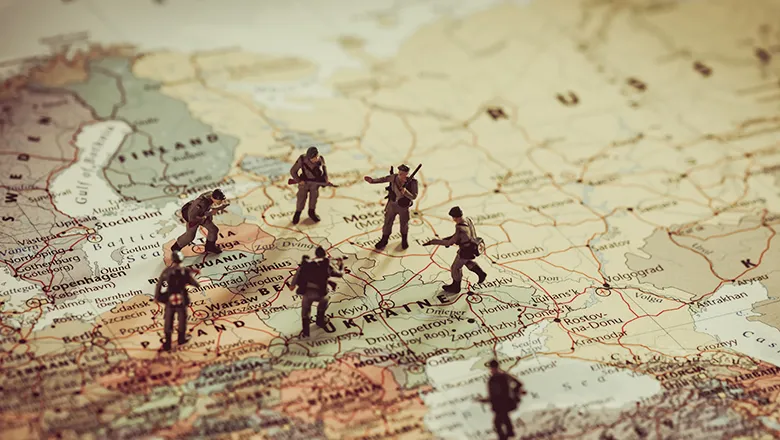05 April 2019
Can NATO expand further to the East without a breakdown in relations with Russia?
Dr Tracey German
TRACEY GERMAN: Eastward enlargement could undermine European security

The 70th anniversary of NATO’s creation also marks 20 years since the first wave of its post-Cold War enlargement, which has proved to be one of the most controversial aspects of the alliance’s transformation, bringing the alliance into competition, and in some cases direct confrontation, with Moscow. NATO’s “open door” policy is a divisive issue for the alliance, not only between NATO and Russia, but also between member states, and will remain a key challenge moving forwards.
Since its establishment in 1949, the number of member states has more than doubled from 12 to 29, with the majority of the new additions acceding in the post-Cold War era. The potential accession of North Macedonia later this year would mean that NATO will have 30 member states, double the number it had in 1991. It is important to remember that enlargement during this time has been driven, to a large extent, by those outside of the alliance seeking to join, rather NATO wanting to expand. Internally, the process has been driven predominantly by the US, which has offered strong support for the membership bids of countries across Central and Eastern Europe. However, enlargement has become a symbolic act rather than one of defensive necessity as the recent accession of members from the Balkans demonstrates: Montenegro’s accession is a vital demonstration of the alliance’s continuing commitment to its promises regarding its open door policy, indicating the primacy of the political, rather than military, aspects of enlargement.
While NATO has undoubtedly played a crucial role in the stabilisation of Central and Eastern Europe since 1991, its stance on enlargement has not only undermined Euro-Atlantic security and triggered new divisions between East and West, it has also exposed aspirant states, particularly former Soviet countries, to sustained pressure and coercion from Moscow. This has ultimately undermined the alliance’s objectives of fostering stability on its periphery.
Enlargement has been a persistent irritant for Moscow since the end of the Cold War. This is reflected in statements from Yeltsin’s 1995 warning that further enlargement would mean a “conflagration of war throughout Europe”, to the 2015 National Security Strategy, which makes several references to NATO’s global reach and interests, further enlargement and the advance of its military infrastructure towards Russia’s borders.
Russia has consistently stated its opposition to any enlargement of the alliance, arguing that NATO is a relic of the Cold War which threatens Russian national interests. This conviction was reinforced when NATO’s first enlargement of the post-Cold War era took place just 12 days before the commencement of its coercive military campaign over Kosovo, when the Czech Republic, Hungary and Poland acceded to the alliance on 12 March 1999. Thus, from Moscow’s perspective, the first act of this newly enlarged alliance was to take offensive action against Serbia, a Russian ally. This reinforced Russia’s view of the alliance as an “aggressive” military organisation that was willing to intervene in the internal affairs of a sovereign state.
Accession remains a central ambition for the governments of Georgia and Ukraine, two countries caught in the crosshairs of tension between Russia and NATO. NATO’s relations with Georgia are among its most complex partnerships and highlight some of the most challenging and interconnected aspects of the alliance’s post-Cold War evolution. Since 2008, Georgia’s desire for membership has focused the alliance’s mind on the issue of future enlargement and relations with Russia, exposing fundamental differences within NATO about its partnerships and priorities, and raising questions about alliance cohesion and unity.
These questions remain as relevant today as they were a decade ago: post-Ukraine, can the alliance continue to ensure the security of its member states while simultaneously developing partnerships with countries within what Russia perceives to be its “zone of privileged interest”? With membership remaining a core objective of both the Georgian and Ukrainian governments, the issue of enlargement will be kept alive and will continue to undermine both intra-alliance relations, as well as those between NATO and Russia, with potentially serious consequences for European security.
Although the alliance continues to stress that its door remains open to any European country “in a position to undertake the commitments and obligations of membership, and contribute to security in the Euro-Atlantic area”, a combination of enlargement fatigue among Western allies, many of whom are focused on internal challenges, concern about the apparent threat from Moscow and a lack of non-contentious countries seeking membership, has undermined alliance consensus regarding future enlargement. The signing of an accession protocol with North Macedonia earlier this year, which needs to be accepted by all 29 member-states, will be a key test of this consensus.
Dr Tracey German is Deputy Dean of Academic Studies (Research), in the Defence Studies Department, King's College London.
